#Lays of Beleriand
Explore tagged Tumblr posts
Text
Reading The Hobbit has a warm, cozy feeling to it, like sitting by a fireplace and downing a warm mug of hot chocolate. There are times when you want to cry, times when you want to laugh, times when you want to fight alongside Thorin’s Company. But at the end of the story, you realise that you will never experience that, because The Hobbit is fictional in reality, but so real in the heart and mind.
Reading The Lord of The Rings has a cool feeling, neither warm nor cold, but a comfortable one; it’s as if you’re sitting by a window, staring into the rain, and wishing you could go outside and relish in the rain but you can’t because it’s cold. There are times when you want to laugh, cry, dine with the Fellowship, fight with the Fellowship. But you can’t, because The Lord of The Rings is only a figment lodged in your heart, tucked away in a cozy spot.
Reading The Silmarillion has the feel of sitting in an enormous library almost abandoned, and fishing out an old, dusty book from a nook long forgotten, written about the history of the world. There are cases when you want to delve into that world and explore it, revel in it, fight it, love it, yell at the people in it. But you can never do that, because it is a history long past, existing only in the minds of very few.
Reading the old stories narrating the entire history of Arda has the feel of travelling back in time to the Library of Alexandria, reading and studying all the library can give. There are times when you want to cry, mourn, grieve, celebrate, laugh, revel in the world. But you can never, as that world, those people, are all part of your heart and mind, tucked away into the most precious part of you.
Reading the legendarium doesn’t make you want to be a part of that world because you love it. It makes you want to be a part of that world because the characters are normal people, like you, who got roped into an unlikely adventure, forever narrated in song, poems, ballads and laments.
They are simple stories, of simple people, in a simple world, where if you existed, you could have been one of those souls both fortunate and unfortunate.
Reading the legendarium makes you want to be part of it, because it makes you think you can survive it.
And certainly, if you have read this amazing mythological masterpiece, you absolutely can survive it.
#jrr tolkien#tolkien#silmarillion#the silmarillion#the silm#the silm fandom#lord of the rings#the two towers#the fellowship of the ring#return of the king#the hobbit#an unexpected journey#desolation of smaug#battle of the five armies#children of hurin#the tale of beren and luthien#beren and luthien#akallabeth#the fall of numenor#unfinished tales#history of middle earth#tolkien povs#the fall of gondolin#the letters of tolkien#the book of lost tales#lays of beleriand#the lost road#history of middle-earth#the return of the shadow#the nature of middle earth
342 notes
·
View notes
Text
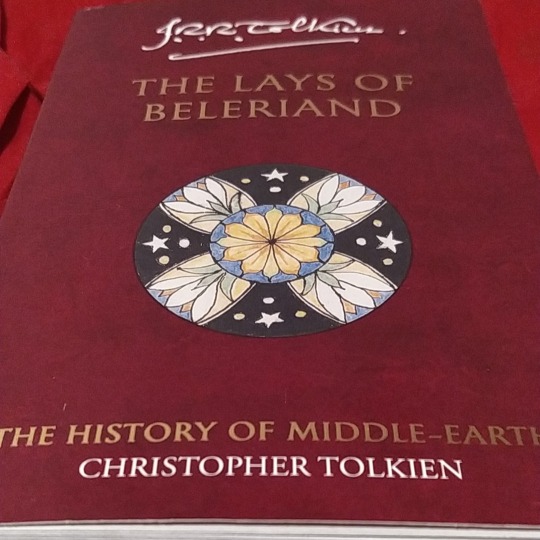
Yessss!
The package came.
@dfwbwfbbwfbwf in first versions of B&L it was Celegorm (not Finrod) who helped Beren. Magic disguise and all. More tomorrow or after I read it. But I thought you'd like to know.
#lays of beleriand#silm#silmarillion#tolkien legendarium#tolkien#the silm#the silmarillion#the history of middle earth
29 notes
·
View notes
Text
Then his sons beside him, the seven kinsmen... these leapt with laughter their lord beside, and with linked hands there lightly took the oath unbreakable; blood thereafter it spilled like a sea and spent the swords of endless armies, nor hath ended yet..."
-- The sons of Feanor take his oath, Flight of the Noldoli (HoME vol. III "The Lays of Beleriand" Poems Early Abandoned, lines 120-130)
#maedhros#maglor#celegorm#caranthir#curufin#amrod#amras#the silmarillion#tolkien tag#history of middle-earth#lays of beleriand#flight of the noldoli
21 notes
·
View notes
Text










The entire Melilot/Maglor section in the Lays of Beleriand. The notes a at the end of Canto I in the Lay of Leithien.
7 notes
·
View notes
Text
There called he longing: '0 Beleg, my brother, 0 Beleg, tell me where is buried thy body in these bitter regions? ' --and the echoes always him answered 'Beleg'; yet a veiled voice vague and distant he caught that called like a cry at night o'er the sea's silence: 'Seek no longer. My bow is rotten in the barrow ruinous; my grove is burned by grim lightning; here dread dwelleth, none dare profane this angry earth, Orc nor goblin; none gain the gate of the gloomy forest by this perilous path; pass they may not, yet my life has winged to the long waiting in the halls of the Moon o'er the hills of the sea. Courage be thy comfort, comrade lonely!
- The Lays of Beleriand, J.R.R. Tolkien
43 notes
·
View notes
Text
really missing the ‘lays of beleriand’ version of the oath where fëanor and sons take it laughing and holding hands….kissing it on the mouth
#and then right after he casually drops that the oath doomed them and is still going 🙃#brought to you by me#every day i wake up + get on my little soapbox#the silmarillion#sad disaster boys (and co.)#the professor's world#lays of beleriand
34 notes
·
View notes
Note
Hi! For the ask game, 12, 18, and 22? — @emyn-arnens
Thanks for the ask! I answered 12 and 22 here. As for 18…
It’s absolutely criminal that the fandom has been sleeping on...
The Lays of Beleriand! I know there are some dedicated fans of it out there, but there should be more. It’s literally SO GOOD. I love it so much. It should get way more attention.
8 notes
·
View notes
Text
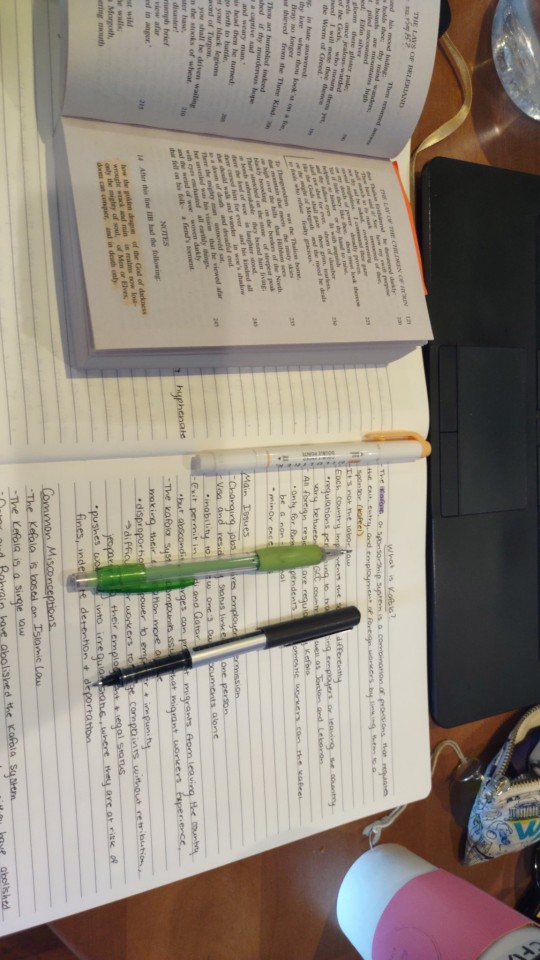
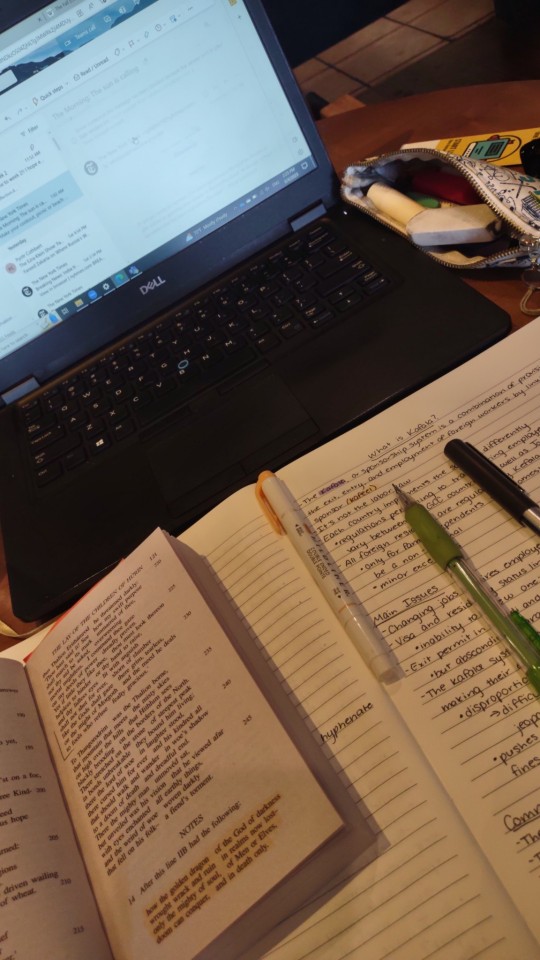
6/3/2023
3 notes
·
View notes
Photo
I have more from this poem for you:
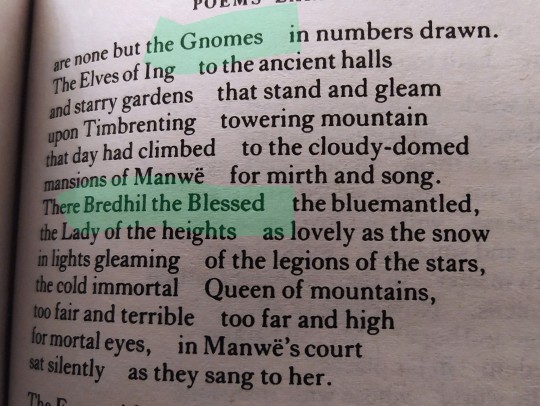
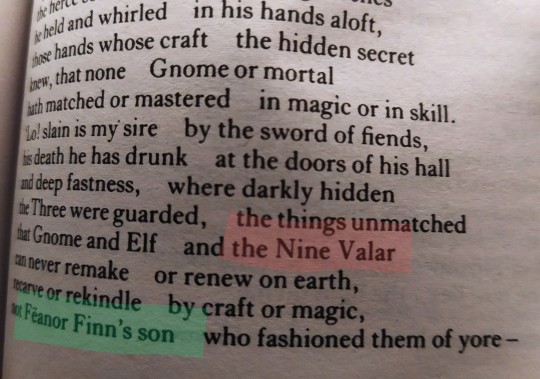
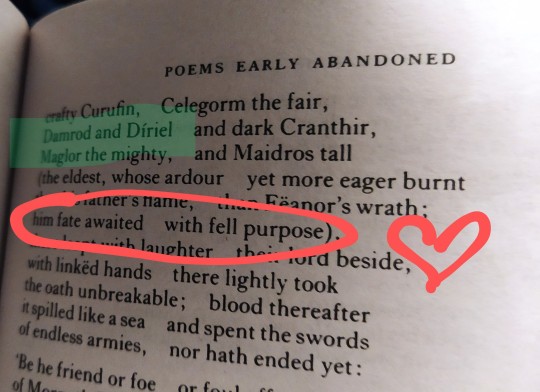

Kindly reminder that the early abandoned poem “The Flight of the Noldoli” ends with the Oath of Fёanor and Fingon yelling “FOOLS” right afterwards.
#whom fate awaited with fell purpose#9 Valar and 7 Valier#lays of beleriand#silm#reblogs#maedhros#silmarillion#tolkien legendarium
1K notes
·
View notes
Text
Please never forget the huge number of people who Lúthien Tinúviel saved.
Of course, her getting the Silmaril eventually allowed Elwing and Eärendil to bring salvation to all of Middle-earth years later; we all know that. But that’s not what I’m referring to.
Never think that Beren was the only person saved by Lúthien’s direct actions during her lifetime. An entire tower full of Sauron’s captives in Tol-in-Gaurhoth were saved and set free when she took control of the island.
She didn’t just grab her boyfriend and run. She tore open all of the dungeons and enabled dozens, if not hundreds, of people to escape with their lives. If it weren’t for her, all of those prisoners would’ve died in torment.
Lúthien is far more than a devoted girlfriend; she’s a true hero of Middle-earth who single-handedly saved at least a dozen lives!!!
#lotr#jrr tolkien#lotr books#lord of the rings#lotr poll#tolkien legendarium#the silmarillion#beren and luthien#the lay of leithian#luthien#first age#luthien tinuviel#beleriand#lúthien#tol in gaurhoth#sauron#lúthien tinúviel#lay of leithian#beren x luthien#silmarils#earendil#elwing
220 notes
·
View notes
Text
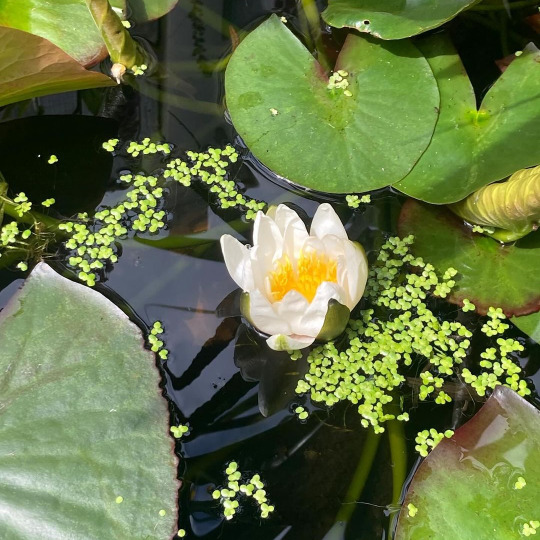


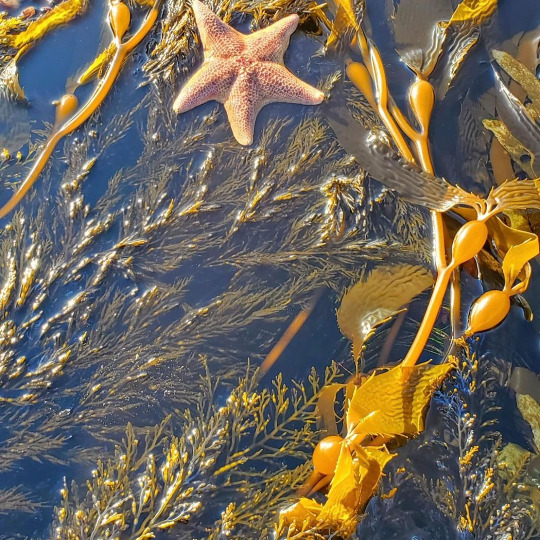




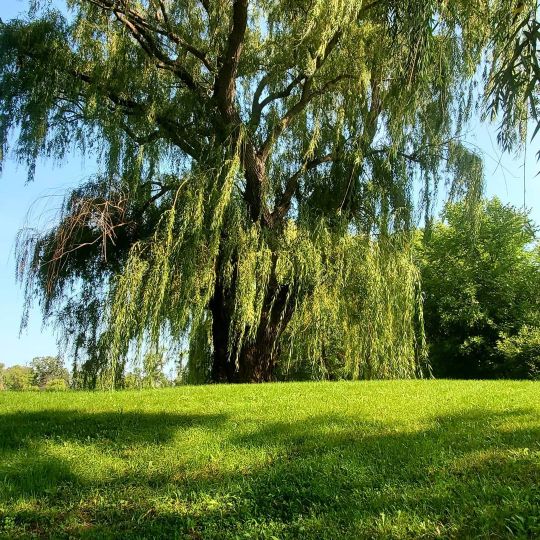
Plants of Tolkien’s works part five!
Previous boards in the Tolkien plant boards tag!
These are from The Fellowship of the Ring, The Lay of the Children of Húrin and Unfinished Tales
x x x x x x
92 notes
·
View notes
Text
Another alliterative verse
While seeking Feanor's speech, I found this gem from Lays of Beleriand and I will again do a very ignorant analysis (sorry I cannot internalize the more subtle rules of how this should work, Jirt seems to ignore them and it makes this even harder)
(Early Silm, so Noldor=Gnomes, and there are 9 male Valar and so on and so forth)
Lo! slain is my sire | by the sword of fiends,
his death he has drunk | at the doors of his hall
that Gnome and Elf | and the Nine Valar
and deep fastness, | where darkly hidden
the Three were guarded, | the things unmatched
not Fëanor Finn’s son | who fashioned them of yore –
can never remake | or renew on earth,
recarve or rekindle | by craft or magic,
the light is lost | whence he lit them first,
\ * ??? proto-Taniquentil? (or whatever it's called)
the fate of Faërie | hath found its hour
Thus the witless wisdom | its reward hath earned
of the Gods’ jealousy, | who guard us here
to serve them, sing to them | in our sweet cages,
to contrive them gems | and jewelled trinkets,
their leisure to please | with our loveliness,
while they waste and squander | work of ages,
nor can Morgoth master | in their mansions sitting
at countless councils. | Now come ye all,
who have courage and hope! | My call harken
to flight, to freedom | in far places!
The woods of the world | whose wide mansions
yet in darkness dream | drowned in slumber,
the pathless plains | and perilous shores
no moon yet shines on | nor mounting dawn
in dew and daylight | hath drenched for ever,
far better were these | for bold footsteps
than gardens of the Gods | gloom-encircled
with idleness filled | and empty days.
Yea! though the light lit them | and the loveliness
beyond heart’s desire | that hath held us slaves
here long and long. | But that light is dead.
Our gems are gone, | our jewels ravished;
and the Three, my Three, | thrice-enchanted
globes of crystal | by gleam undying
illumined, lit | by living splendour
and all hues’ essence, | their eager flame –
Morgoth has them | in his monstrous hold,
my Silmarils. | I swear here oaths,
unbreakable bonds | to bind me ever,
by Timbrenting* | and the timeless halls
of Bredhil the Blessed** | that abides thereon –
may she hear and heed – | to hunt endlessly
unwearying unwavering | through world and sea,
through leaguered lands, | lonely mountains,
over fens and forest | and the fearful snows,
till I find those fair ones, | where the fate is hid
of the folk of Elfland | and their fortune locked,
where alone now lies | the light divine.’
** I guess that's proto-Varda?
#I want “Lays of Beleriand”!#I love it#it's just so#most language to ever language#<3 <3 <3#tolkien legendarium#tolkien#alliterative verse#poetry#technically it's not yet Silm#lays of beleriand#what even a lay is?#it's a kind of chips...#but also apparently a cool poetic thing?#it is so awesome#better than the oath even#the multi-verse alliterations!!!#i just
15 notes
·
View notes
Text
The wars and wandering of the Gnomes this tale tells not. Far from their homes they fought and laboured in the North. Fingon daring alone went forth and sought for Maidros where he hung; in torment terrible he swung, his wrist in band of forged steel, from a sheer precipice where reel the dizzy senses staring down from Thangorodrim’s stony crown. The song of Fingon Elves yet sing, captain of armies, Gnomish king, who fell at last in flame of swords with his white banners and his lords. They sing how Maidros free he set, and stayed the feud that slumbered yet between the children proud of Finn. Now joined once more they hemmed him in. even great Morgoth, and their host beleaguered Angband, till they boast no Orc nor demon ever dare their leaguer break or past them fare.
"The Lay of Leithian", Canto VII, The Lays of Beleriand
#the old Tolkien stuff is extremely metal#fingon#maedhros#tolkien#30 days of fingon#tolkien quotes#nolofinweans#lay of leithian#the lays of beleriand#silmarillion
25 notes
·
View notes
Text
"But Finrod walks with Finarfin his father beneath the trees in Eldamar"
I think it's no surprise to my followers who pay attention to my silm posting that I love Finrod Felagund's character, but this is the line that sticks with me heavily. Within the Quenta Silmarillion, it is told that all of those Ñoldor caught within the Doom of Mandos and of the Silmarils will "yearn for [their] bodies, and find little pity", which is often taken to mean that none of those who left Valinor would be granted the possibility of returning to physical form, to live in the bliss of Aman (though arguments can clearly be made that only those who participated in the kinslaying were under such a doom, but I choose to ignore that). That's what makes this line so much more impactful to me, along with a more important facet; it's placement in the chapter.
Just 2 pages earlier, at his death, Finrod says it will be long before he is seen again amongst his people, perhaps believing he will not be granted a bodily form until such a time as the rest of the Ñoldor would be. He dies in the darkness of his corrupted tower, and is mourned at length by Beren until Lúthien his love arrives and rouses him, and together their hope is kindled again as the sun rises (a very common theme in Tolkien's works). They honour and bury Finrod atop the island, a tomb to be unchanged until the War of Wrath caused upheaval in all of Beleriand
It's here that this line comes in. His tomb is inviolate until all the land is, but he himself walks with his father, the only of Finwë's sons to remain in Valinor, and that says so many things.
He is one of few, or perhaps the only, Ñoldorin exile to be gifted bodily rebirth. He surpassed the Doom of Mandos (see my 2nd link in paragraph 1)
His father welcomes him home and forgives his leaving
No matter the state of his grave, Felagund is himself unmarred
No timeline is given for Finrod's bodily resurrection, but I choose to believe it is before the end of the First Age (and the fandom wiki agrees, tolkien gateway being more vague), for no other reason than Eärendil. It is because of Finrod, his assistance of and sacrifice for Beren, that the man of Bëor lives long enough to be united with Lúthien in the Quest, and they, along with Huan, are able to retrieve the Silmaril that Eärendil brings to Aman. I consider that Finrod is likely unaware of the success of the Quest, given it seems the rest of Valinor was (or at least they waited for a plea from Middle-Earth before acting on anything). Imagine his wonder, his pride, and his joy, at seeing that not only was the quest successful, but here, 80 years after he died, he sees Beren and Lúthien's grandson-in-law bearing the jewel. I wonder what he would have said to Amarië his love, if he would have remarked in joyous tears that the horrors and the death that led him back into Aman were not faced in vain. I wonder if, taking up his weapon to participate in the War of Wrath, he either sat a moment in sorrow, or in hope, or in some other emotion, considering what lay ahead of him, and as he came home afterwards with many of his kinsfolk, what he felt as he came to the bliss that would last until the changing of the world.
No matter his feelings on the Wars, what his experiences are and what he goes through after his resurrection, we know this:
Finrod walks with Finarfin his father beneath the trees of Eldamar
#silmarillion#tolkien#finrod felagund#finrod#findarato#findaráto#beren erchamion#beren#luthien tinuviel#luthien#lúthien#finarfin#eärendil#earendil#amarië#one day I will own the lays of beleriand and be even further enamoured with his tale
57 notes
·
View notes
Text
I'm not sure if this has been talked about before, but I'm gonna talk about it regardless because it has completely blown my mind. I first discovered it on a reddit post, which you can read here.
In the book The History of the Hobbit, John Rateliff suggests that the Wilderlands of The Hobbit is actually the Beleriand of Tolkien's early mythology as it was written during the 1930's, only taking place ages after the War of the Jewels, since the later ages and maps of middleearth hadn't been created by Tolkien yet. Keep in mind that at this point in Tolkien's writings, the breaking of Thangorodrim was nowhere near as bad as it would later turn out to be. Beleriand never sank into the sea, but it was still drastically changed.
Here are two maps drawn by Tolkien during the 1930's, one of Beleriand and the other of the Wilderlands found in the Hobbit:
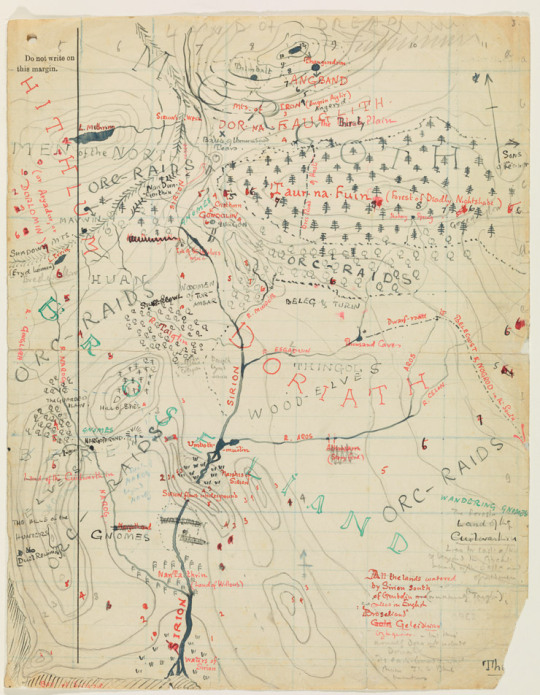
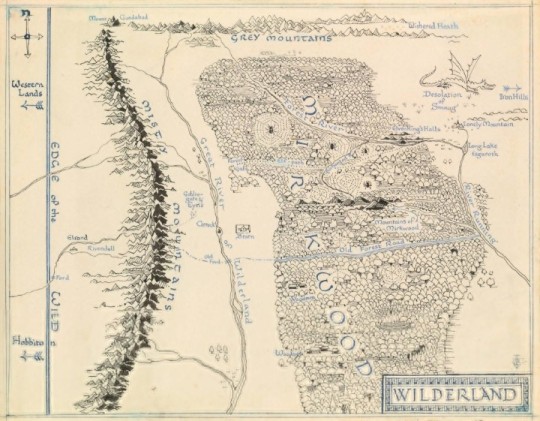
In terms of similarities, one of the first things I noticed(and one of the most obvious) was the river Sirion and the Great River of the Wilderlands. The name Sirion literally translates to 'Great River'.
In the middle of the path of said river is the Carrock, which is where the Eagles set Bilbo and Company down after saving them, and the way it is described in the Hobbit reminds me a lot of this illustration Tolkien made of Tol-Sirion:
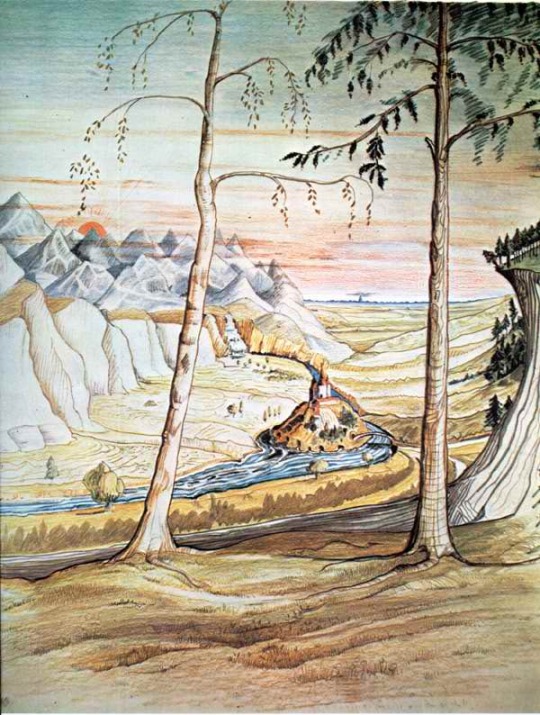
"But cropping out of the ground, right in the path of the stream which looped itself about it, was a great rock, almost a hill of stone, like a last outpost of the distant mountains, or a huge piece cast miles into the plain by some giant among giants."
-The Hobbit, Queer Lodgings.
AND it is also uses very similar wording to how the Lay of Leithian describes Tol-Sirion(Tolkien was working on the Leithian around the same time he was writing The Hobbit):
'An isled hill there stood alone/ amid the valley, like a stone/rolled from the distant mountains vast/when giants in tumult hurtled past'
-Lay of Leithian.
There's also the mention of "a little cave, (a wholesome one with a pebbly floor) at the foot of the steps" which the person in the reddit post suggests could be the remains of the very same dungeon where Finrod, Beren, and their companions were imprisoned by Sauron after their disguises were stripped away. The same place where all but one of them were slowly devoured one by one. The same place where Finrod died.
Above it at the top of the Carrock would be where Finrod was buried, and the "Ford of huge flat stones [that] led to the grass-land beyond the stream" could be the remains of the broken bridge that was destroyed by Luthien: "the hill trembled; the citadel/crumbled and all its towers fell/the rocks yawned and the bridge broke/and Sirion spurned in sudden smoke."
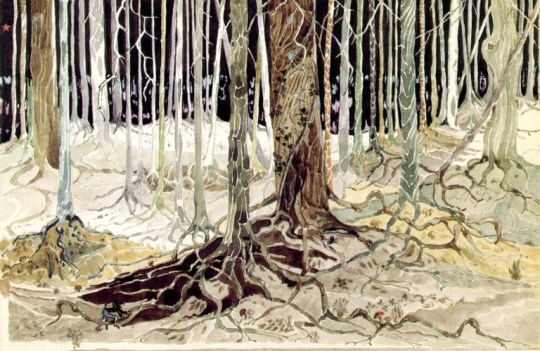
The "two Mirkwoods" is also a big one. I always found it odd that there were two completely different forests sharing the same name, but at the time Tolkien wrote it, they weren't seperate at all, but the exact same forest, just changed and grown over thousands of years in between the events of the Silmarillion and The Hobbit. The same forest that Sauron fled to after the fall of Tol-in-Guarhoth. The same one Beleg found Gwindor in after his escape from Angband.
If they really were intended to be the same forest at the time Tolkien wrote it, it also answers the question I had earlier regarding this part in the Leithian when Sauron flees Tol-in-Guarhoth:

A new stronghold? We never hear anything about this in the Silmarillion, of Sauron building a new stronghold in Taur-nu-fuin, and it puzzled me when I first read it. But that's when I realized that this "new throne and darker stronghold" was talking about none other than the fortress of Dol Guldur itself, Sauron's stronghold within Mirkwood.
(Not lying, I was pretty proud of myself for figuring that one out)
Oh, and the Lonely Mountain? While it doesnt appear on the 1930's Beleriand map, it would likely be Maedhros's fortress of Himring itself, or at least the mountain it was built on top of, as Himring is located east of Taur-nu-fuin just about in the same place where Erebor is located. Just the thought of the Dwarves' home being within the very mountain that once had Maedhros's citadel atop it has my brain going wild. (Oh, and the fact that the arkenstone was found within the ancient hills of what was once Himring, fortress of the elf lord who threw himself into a fiery chasm with a silmaril? Coincidence? I think NOT)
There are plenty of other similar locations between the two maps, and judging by them both Eriador would be Hithlum/Aryador, with the Misty Mountains being the Mountains of Shadow. The Withered Heath would be the Anfauglith, the Eagle Eyrie would be the Crissaegrim, and the Iron Hills are what's left of Nogrod and Belegost. I've even heard that Mavwin/Morwen's house could be the roots of Rivendell.
Overall, it's so, so cool and it has my mind running wild. It really makes me see The Hobbit in a whole new light. We all talk about the amazing stories that came out of the Hobbit aka Lord of the Rings, but seeing where the stories of the Hobbit came from just adds a whole other level of depth to it all. This is why I love Tolkien's works so much. It's all so incredibly deep and rich and it just gets better and richer the deeper you go, and there's so much of it. It's one of those things that you just rarely get tired of, and even if you do, you're bound to come back to it later and I love it.
#Tolkien#Silmarillion#Hobbit#Lay of Leithian#Beleriand#Wilderlands#Lotr#Erebor#Taur-nu-fuin#Mirkwood#Lonely Mountain#Sirion#Finrod#Beren#Luthien#Maedhros#Sauron#Tol-Sirion#Tol-in-Guarhoth
385 notes
·
View notes
Text
<- experiencing shrimp emotions (listening to the return of the king ost: battle of the pelennor fields)
#rimi talks#the violin solo does things to me man...#you ever think abt that one throwaway line in yj98 that confirms kon's into lotr#they did that for me specifically.#i know in my heart that while he's primarily in wendy fandom...#kon has definitely written star wars. star trek. and silmarillion fanfic#he's one of those guys making scifi aus about the silm. girdle of melian as a cloaking device. thangorodrim black hole something something.#god fuck i want to watch/read lotr again. and the silm. and home. aakjshguarhgh#wheres my copy of the lays of beleriand i NEED to reread...#<- i experience this literally every time i listen to the lotr ost#lord the horn section before the violin solo. WAILS into my hands
31 notes
·
View notes